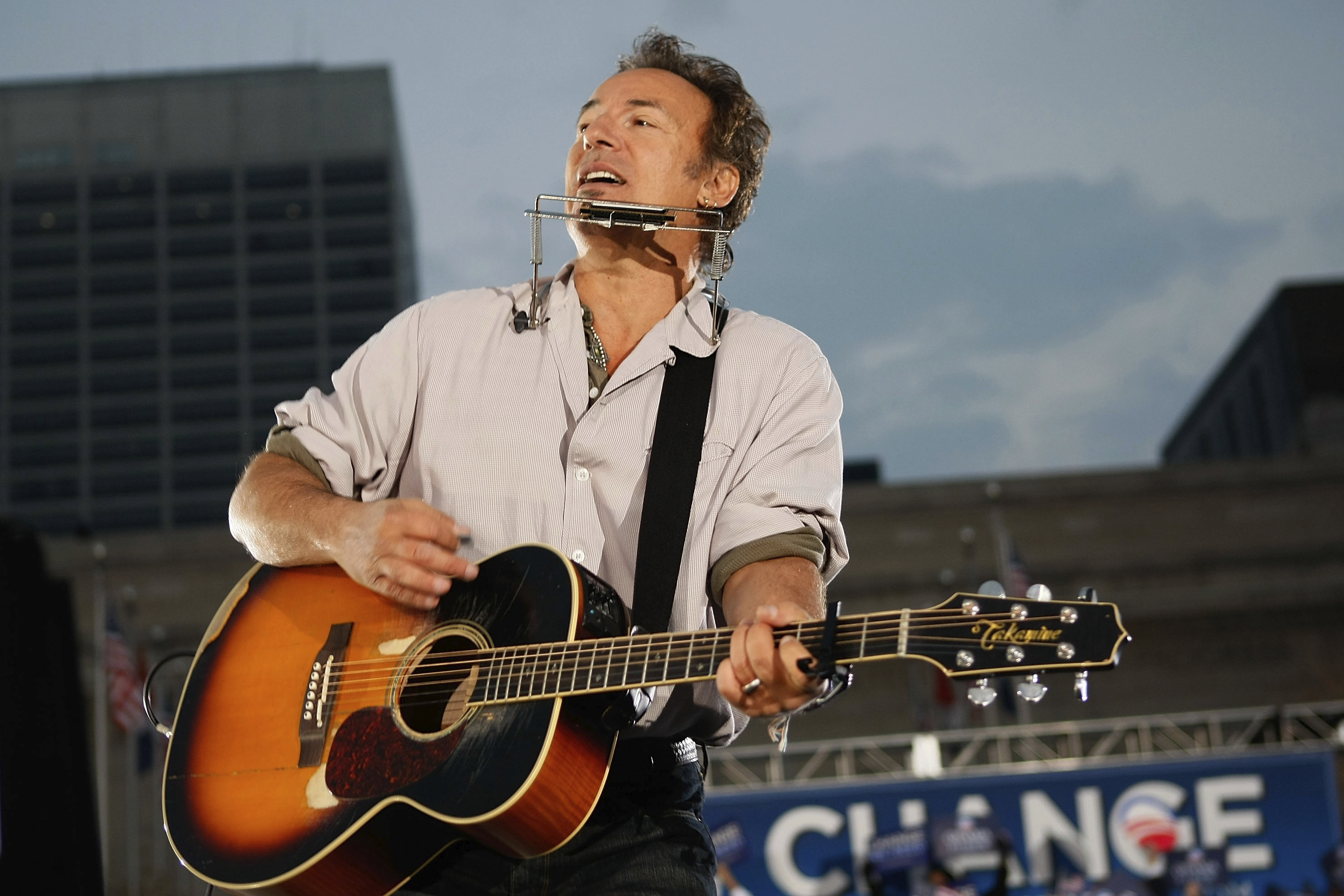When North Carolina passed a new ‘bathroom bill’ this past spring, restricting transgender access to public bathrooms and limiting LGBTQ people’s right to sue for workplace discrimination, Bruce Springsteen canceled his Greensboro, N.C. concert in protest.
The singer, songwriter, and humanitarian is a longtime supporter of LGBTQ rights. When he publicly supported Barack Obama’s run for President in 2008, for example, he did so because he thought Obama would protect a broad definition of family.
“He trusted that Obama would allow for different kinds of families,” says Cyrus “Ernie” Zirakzadeh, professor of political science in the College of Liberal Arts and Sciences.
Zirakzadeh has made an in-depth study of Springsteen’s political opinions, and recently presented a paper on the topic at the 2016 Midwest Political Science Association conference, titled “Badlands and Good Lovin’: Bruce Springsteen and the American Pastoral Tradition.”
For the most part, Springsteen thinks placing one’s trust in elected politicians is foolish. — Cyrus 'Ernie' Zirakzadeh
He notes that despite a nearly 40-year career of songs that comment on the American experience, it’s only in recent years that Springsteen has begun to make his political opinions known publicly. Zirakzadeh says that may be because his political opinions are hard to pin down. He defines them as neither politically left nor right, but as a pastoral-frontier style of reasoning, that celebrates individuality, distrusts technology, and holds that regular people should rule the country.
“Springsteen doesn’t want people to be treated as children to be looked after,” says Zirakzadeh. “He wants us to be adults, to shape our future.”
Work and oppression
Springsteen is not alone as a musician who champions the working class. Others include John Mellencamp, Bob Seger, and J. Giles. But his popularity and staying power in the American psyche set him apart, Zirakzadeh says.
The heroes in his songs often face unemployment or are engaged in degrading, mechanized work. Their stories echo that of Springsteen’s father, who worked as a jail guard, cab driver, and assembly-line worker in New Jersey.
Ironically, Springsteen has said that he doesn’t care for his nickname, “The Boss,” because he hates bosses.
The singer often blames technological innovation and large corporations for the disappearance of satisfying work and the loss of skilled manufacturing jobs, Zirakzadeh says. “He thinks the shortages of occupations in this country should be taken as a yardstick of the country’s moral decline.”
The inability to find work is the theme of several of Springsteen’s albums, and in many songs, laborers on modern worksites trudge around like lifeless zombies. At night, they fantasize about breaking free from life’s drudgery.
That pain, says Zirakzadeh, is where Springsteen looks for solutions.
Freedom personified
To attend a Bruce Springsteen concert is a full-throttle rite of passage: the three-hour spectacles are part baptism, part protest, and part dance party.
“Thousands of strangers scream in unison that America comprises a series of ‘badlands’ that need to be resisted, and declare that they are ‘tramps’ who will ‘never surrender,’” notes Zirakzadeh.
In his songs, Springsteen’s characters are often tempted toward violence to release their frustrations, but ultimately turn to each other. Many of his most popular songs, such as “Tenth Avenue Freeze-out” and “Dancing in the Dark,” portray working-class people letting loose in pubs, dance clubs, and block parties. The singer’s notion of freedom, says Zirakzadeh, emphasizes individuals’ rights to their own decisions about how to move, look, and behave.
He often looks to these communities, to grassroots efforts and non-governmental organizations, to band together and work to solve societal problems, such as the specter of large corporations moving in on hometown values.
Springsteen also reveres monogamy. His love songs offer tender narratives of a devoted breadwinner, often a man; and a patient caregiver, often a woman. Together, says Zirakzadeh, the lovers create an autonomous home that can hold at bay the harshness of the broader world.
Adverse conditions, such as the economy and unemployment, threaten to impede and crush love in many of his songs. That’s where Springsteen sees a responsibility for the federal government: the protection of people’s right to love.
Left or Right?
Zirakzedeh notes that Springsteen has yet to endorse a political candidate in this year’s Presidential campaign. He says the singer’s political outlook can’t be defined in terms of liberal or conservative, but instead eschews modern politics altogether, holding that policies should be made by the people directly affected, rather than by elected professionals.
“For the most part, Springsteen thinks placing one’s trust in elected politicians is foolish,” he says.
In the singer’s ideal America, people are kind, active, and strong-willed; they think independently, yet are willing to help fellow human beings; and they spontaneously work together to ward off threats. Small businesses and farms would dot Springsteen’s country, and mechanized tools would take a backseat to pride in one’s craft.
Among this election cycle’s presidential hopefuls, Vermont Senator Bernie Sanders’ proposals aligned most closely with Springsteen’s ideals. But no possible candidate, he says, would have scaled back the government enough for the singer’s tastes.
“Part of the beauty of Springsteen’s music is that he urges us to pursue higher goals beyond amassing money and becoming bosses,” says Zirakzadeh. “He sees a local texture to society. We aren’t just a bunch of self-seeking individuals. We are also embedded in and enhanced by our families, neighborhoods, and local communities, and they need to be protected.”



